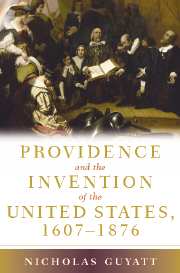Book contents
- Frontmatter
- Contents
- Acknowledgments
- Introduction
- PART ONE BRITAIN, AMERICA, AND THE EMERGENCE OF PROVIDENTIAL SEPARATISM
- 1 Providence and the Problem of England in Early America
- 2 “Empires are Mortal”: The Origins of Providential Separatism, 1756–1775
- 3 “Becoming a Nation at Once”: Providentialism and the American Revolution
- PART TWO PROVIDENCE, RACE, AND THE LIMITS OF REVOLUTION
- Index
3 - “Becoming a Nation at Once”: Providentialism and the American Revolution
Published online by Cambridge University Press: 12 December 2009
- Frontmatter
- Contents
- Acknowledgments
- Introduction
- PART ONE BRITAIN, AMERICA, AND THE EMERGENCE OF PROVIDENTIAL SEPARATISM
- 1 Providence and the Problem of England in Early America
- 2 “Empires are Mortal”: The Origins of Providential Separatism, 1756–1775
- 3 “Becoming a Nation at Once”: Providentialism and the American Revolution
- PART TWO PROVIDENCE, RACE, AND THE LIMITS OF REVOLUTION
- Index
Summary
By July 1775 British troops had brutally engaged Patriot forces at Breed's Hill in Boston, George Washington had been placed in command of the new Continental army, and many Americans had resigned themselves to open war with Britain. The Second Continental Congress, meeting in Philadelphia, had not decisively embraced the cause of independence – on July 5, delegates approved a last-ditch proposal to George III that the two sides should return to the economic and political status quo that prevailed before 1763. (The king dismissed the Olive Branch Petition when it arrived in London the following month and declared the colonists to be in open rebellion.) But in a “Declaration on the Causes and Necessity of Taking Up Arms,” issued by the Congress a day after the petition to George III, it was clear that delegates recognized the potential of historical providentialism to bolster the war effort. Having narrated a history of American development that largely excluded European influence, save to observe that Britain's pretensions to power were dependent upon its American colonists and trade, the declaration rehearsed arguments that Thomas Paine would popularize a few months later in Common Sense. God had never intended one country to maintain such power and influence over another, but he had postponed an inevitable conflict with Britain until the colonists “were grown up to our present strength.”
- Type
- Chapter
- Information
- Providence and the Invention of the United States, 1607–1876 , pp. 95 - 134Publisher: Cambridge University PressPrint publication year: 2007



